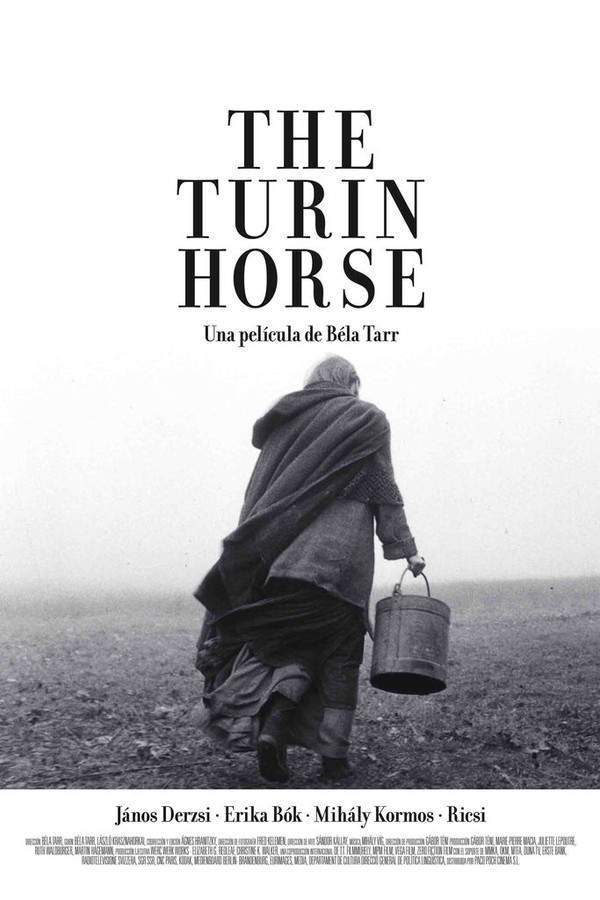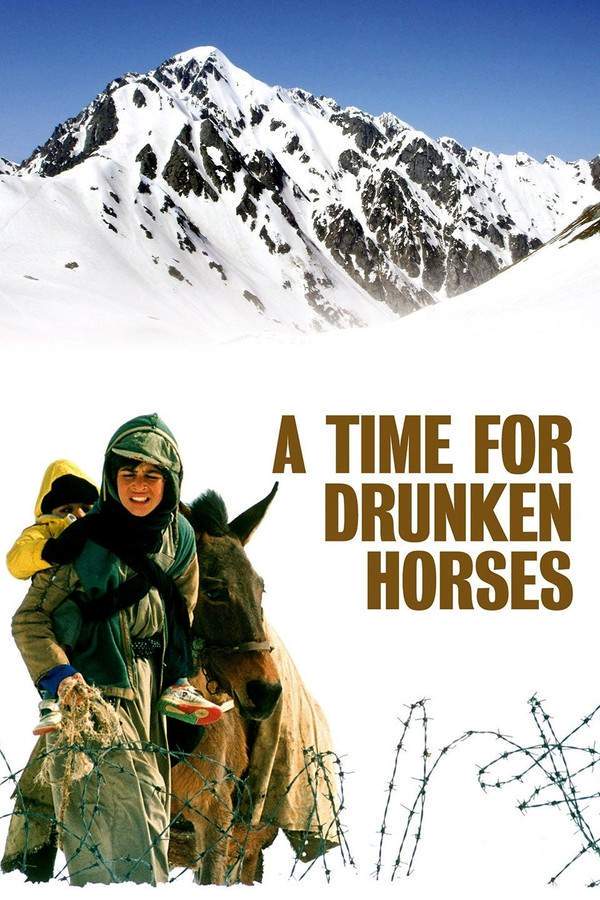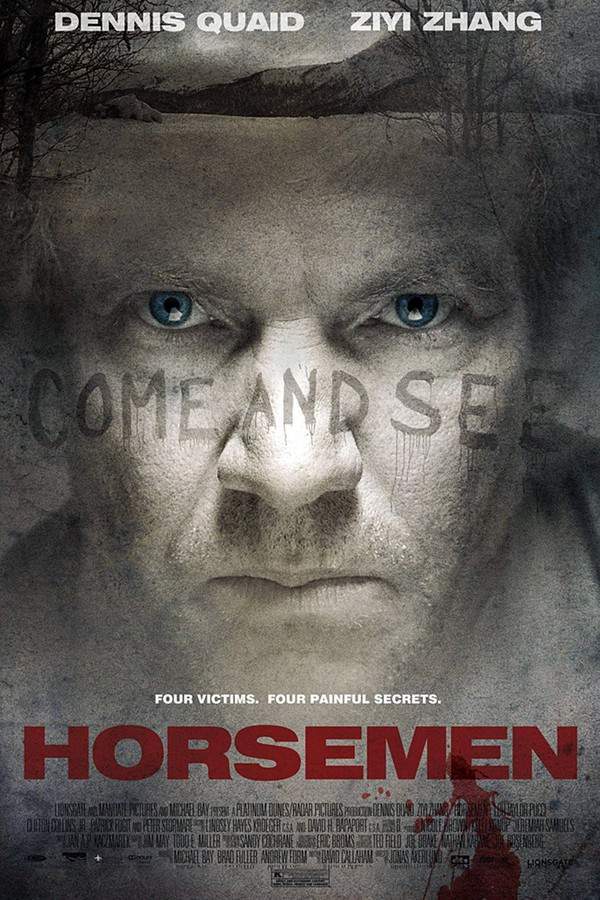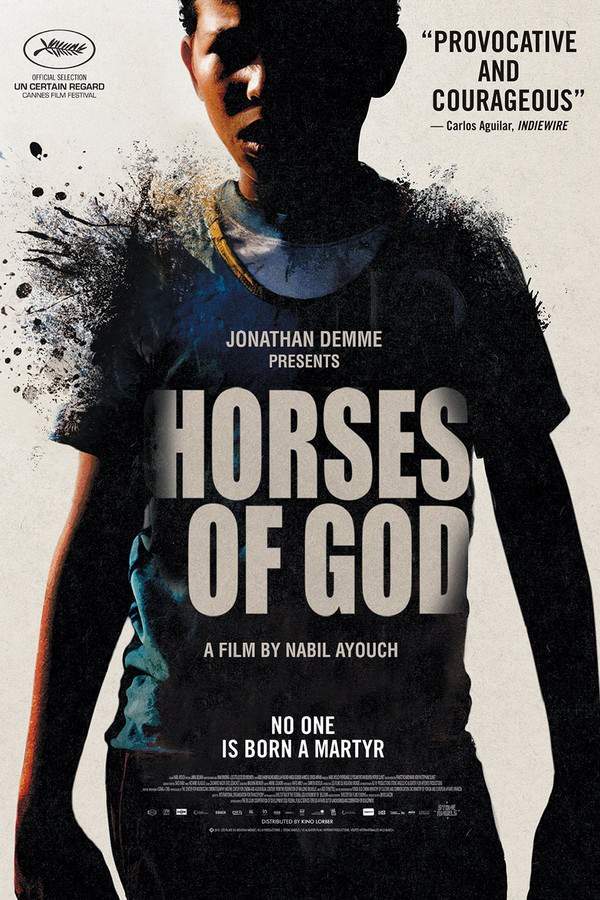
Horses of God 2014
Directed by

Nabil Ayouch
Made by
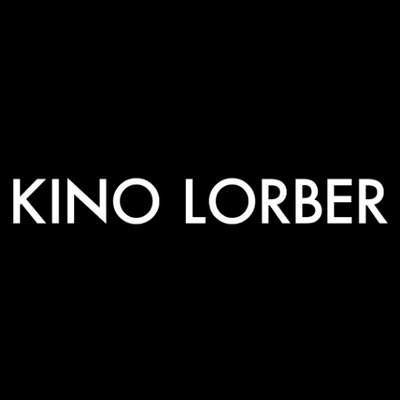
Kino Lorber
Test your knowledge of Horses of God with our quiz!
Horses of God Plot Summary
Read the complete plot summary and ending explained for Horses of God (2014). From turning points to emotional moments, uncover what really happened and why it matters.
The film begins in 1994, introducing us to Yachine, known as Tarek, his aggressive older brother Hamid, and their friends Nabil, the son of local prostitute and singer Tamou, pot-smoking Fouad, and Khalil. They all live in severe poverty in Sidi Moumen, a shanty town on the outskirts of Casablanca, Morocco. Hamid resorts to becoming a drug mule for income, engaging in criminal activities. In one shocking scene, the boys steal alcohol from Khalil’s father’s wedding, leading to a tragic moment where Hamid assaults a drunken Nabil in front of the others.
By 1999, the shanty town has expanded considerably, coinciding with the death of Hassan II of Morocco. Here, Yachine, Nabil, Fouad, and Khalil spend their days smoking marijuana. Yachine harbors feelings for Ghislaine, Fouad’s sister. Meanwhile, Hamid has become a notable drug dealer, keeping a corrupt policeman called Pitbull in his pocket and pushing Yachine away from a life of drugs. The political climate becomes hostile as religious zealots drive Tamou from their community. After throwing a rock at Pitbull’s car, Hamid receives a two-year prison sentence. Yachine faces expulsion from the marketplace, leading Nabil to secure him a job with repairman Ba’Moussa.
Following the September 11 attacks, Hamid emerges from prison, renouncing drugs in favor of radical Islam. In a twist of fate, Yachine is forced to kill Ba’Moussa after the man attempts to assault Nabil. With Hamid’s help, they conceal the crime and find refuge in an Islamic compound hidden in the town. It’s here that Yachine and Nabil come under the influence of Abou Zoubeir, who indoctrinates them into radical Islamic beliefs. Khalil and Fouad are coerced into joining as well, and they begin training in jujutsu. As guilt over the murder weighs heavily on Yachine, he seeks comfort from Nabil but is also captivated by Zoubeir’s teachings on forgiveness through radicalism.
Fast forward to November 2002: Tarek (the former Yachine), along with Nabil and Fouad, fully embrace their new ideology. They are welcomed into the inner circle of the radical group, which enrages Hamid. A montage dramatically illustrates the transformation of the friends. However, Tarek faces heartache when he learns that Ghislaine is set to marry someone else.
In February 2003, law enforcement disrupts a radical Islamic gathering, where Tarek is assaulted. Abou Zoubeir begins to emphasize the concept of martyrdom. Tamou tries to reach out to Nabil, but he rebuffs her advances and gifts. An enigmatic emir arrives with an even stronger message of becoming martyrs, advising the young men, > “Take care, children of Islam, never to become like those who cling to life down here and fear to become martyrs. Fly, horses of God, and the gates of paradise will open for you.” This further fuels Hamid’s jealousy towards Tarek.
As May 9, the day of the planned attack, nears, tensions rise. Abou Zoubeir panics and flees as police close in, prompting the attack to be postponed until May 16. The group ventures into the picturesque foothills near Casablanca, marveling at the wealth and lush landscapes, a stark contrast to their barren life. They camp in a forest, eagerly anticipating their violent mission. During this time, Tarek dreams that after becoming a martyr, Ghislaine will remember him fondly. Hamid struggles to dissuade Tarek from going through with the attack.
On May 15, they return to the shanty town to finalize their preparations with the rest of their cell. The next day, Hamid, Fouad, Tarek, and Nabil explore Casablanca, ultimately arriving at the Casa de España restaurant. Despite Hamid’s attempts to protect Tarek from the dire fate ahead, Tarek pushes him away. Fouad chooses flight over fate, leaving Tarek and Nabil to carry out the horrific act. The screen fades to black as the brothers set off their bombs.
In a haunting conclusion, children in Sidi Moumen play football in the night, momentarily pausing to absorb the distant explosions reverberating through the city. The end credits elaborate on the 2003 Casablanca bombings, detailing the locations and casualties of that tragic day.
Horses of God Timeline
Follow the complete movie timeline of Horses of God (2014) with every major event in chronological order. Great for understanding complex plots and story progression.
Introduction to Characters
In 1994, we meet *Yachine*, also known as Tarek, and his aggressive older brother *Hamid* in the shanty town of *Sidi Moumen* near *Casablanca*. They are joined by friends *Nabil*, who has a troubled family background, *Fouad*, a pot smoker, and *Khalil*. Together, they navigate their harsh realities of life in extreme poverty.
Hamid's Descent into Crime
As they grow older, *Hamid* turns to crime to support his family, becoming a drug mule. His criminal activities highlight the desperation of their living conditions and foreshadow the dangerous path that he and his friends will follow. This ultimately sets the tone for the darker elements of their story.
The Tragic Incident
In a pivotal scene, the boys steal alcohol from *Khalil*'s father's wedding. This youthful rebellion leads to a tragic confrontation where *Hamid* violently attacks a drunken *Nabil*, showcasing the deep-seated issues of aggression and despair among them. This moment exacerbates the boys' troubled lives.
Shanty Town Expansion and Hamid's Drug Empire
By 1999, *Sidi Moumen* has expanded significantly coinciding with the death of *Hassan II* of Morocco. During this period, *Hamid* rises as a drug dealer, while the boys remain entrenched in boredom and despair. Meanwhile, *Yachine* develops feelings for *Fouad*'s sister, *Ghislaine*, adding a layer of complexity to their lives.
Hamid's Imprisonment
*Hamid* faces legal trouble after throwing a rock at a corrupt policeman, *Pitbull*, resulting in a two-year prison sentence. This forces *Yachine* to navigate life without his older brother's influence. The political unrest in the area further complicates their lives, especially for those like *Tamou*.
Transformation After September 11
Following the September 11 attacks, *Hamid* renounces drugs and embraces radical Islam upon his release from prison. His drastic transformation serves as a critical turning point for him and *Yachine*, reflecting the broader societal shifts at this time. They find themselves drawn into a dangerous new ideology.
Yachine's Guilt and Escalation
In a tragic twist, *Yachine* kills *Ba'Moussa* after the latter attempts to assault *Nabil*. Struggling with immense guilt, *Yachine* confides in *Nabil* while being increasingly influenced by *Abou Zoubeir*, leading him further down the path of radicalization. The dark reality of their choices begins to unfold.
Indoctrination into Radicalism
Under the guidance of *Abou Zoubeir*, *Yachine* and *Nabil* become deeply indoctrinated into extremist ideologies alongside *Khalil* and *Fouad*. This transformation sees them training in jujutsu and embracing a violent belief system. The ideological fervor intensifies as they bond through their shared convictions.
Embracing Martyrdom
By November 2002, *Tarek* and his friends have fully embraced their radical beliefs. They are welcomed into the inner circle of a militant group, causing tension with *Hamid*. This pivotal shift marks them as willing participants in a dangerous plot, with the painful reminder of *Ghislaine* haunting *Tarek*.
The Call to Violence
In February 2003, law enforcement disrupts a radical gathering, increasing tensions within the group. Their leaders emphasize martyrdom, compelling the young men to abandon their fears of death for a higher cause. This galvanizes their resolve and propels them closer to carrying out their violent intentions.
Building Up to the Attack
As May 2003 approaches, anticipation builds for their planned attack, leading to growing anxiety among the group. After a close call with police, the attack is postponed, yet their hunger for violence only escalates. This moment reflects their mental struggles and the looming threat to innocents in *Casablanca*.
Final Preparations
On May 15, the group returns to *Sidi Moumen* to finalize preparations for their impending attack. *Tarek* faces internal conflict as *Hamid* desperately tries to dissuade him from going through with their violent plans. This tension builds the emotional stakes leading into the final act.
The Horrific Act
On May 16, *Tarek*, *Nabil*, and *Fouad* carry out their plan amidst the lively streets of *Casablanca*. *Fouad*, paralyzed by fear, abandons the mission, leaving *Tarek* and *Nabil* to proceed alone. The screen fades to black as the tragic consequences of their actions unfold, leaving an indelible mark on their community.
Aftermath and Reflection
In the haunting conclusion, children in *Sidi Moumen* play football while distant explosions reverberate through the city. The end credits note the **2003 Casablanca bombings**, recounting the tragic events and revealing the devastating impact of radicalization on young lives caught in the turmoil of their environment.
Horses of God Characters
Explore all characters from Horses of God (2014). Get detailed profiles with their roles, arcs, and key relationships explained.
Yachine (Tarek)
Yachine, known as Tarek, is a young man entangled in the harsh realities of life in Sidi Moumen. He struggles with identity, grappling with his desire for a better future while being drawn into the world of radicalism. His journey is marked by guilt and longing, particularly for Ghislaine, leading to a tragic conflict between love and ideology.
Hamid
Hamid is Tarek's aggressive older brother, who transforms from a petty criminal to a prominent drug dealer. His turbulent journey reflects the pressures of their environment and the expectations of masculinity. His shift towards radical Islam after prison complicates his relationship with Tarek, as he attempts to assert control over his brother's life.
Nabil
Nabil is a close friend of Tarek and a pivotal character in the film. He embodies innocence amid chaos, initially seeking escape through leisure but later becomes a key figure in Tarek's life choices. Nabil's relationship with his mother and his interactions with Tarek highlight the theme of friendship and the search for purpose.
Fouad
Fouad is a pot-smoking companion who shares in the reckless abandon of youth with Tarek and the others. His character represents the apathy and disillusionment among the youth in Sidi Moumen. As events unfold, his struggle to face reality culminates in a critical choice that impacts Tarek's fate.
Horses of God Settings
Learn where and when Horses of God (2014) takes place. Explore the film’s settings, era, and how they shape the narrative.
Time period
1994-2003
The film unfolds over nearly a decade, from 1994 to 2003, a period marked by significant political and social upheaval in Morocco. It includes pivotal events such as the death of King Hassan II and the aftermath of the September 11 attacks, which influenced radicalization in the region. These years saw a rise in religious extremism and shifting societal values, shaping the characters' lives and decisions.
Location
Sidi Moumen, Casablanca
Sidi Moumen is a shanty town on the outskirts of Casablanca, Morocco, known for its impoverished living conditions. It serves as the backdrop for the struggles and lives of the film's characters, reflecting the socio-economic challenges faced by many in the area. The stark contrast between the shanty town's harsh reality and the vibrant life of Casablanca highlights the disparities within Moroccan society.
Horses of God Themes
Discover the main themes in Horses of God (2014). Analyze the deeper meanings, emotional layers, and social commentary behind the film.
💔
Radicalization
Radicalization is a central theme of the film, exploring how disenfranchised youth can be influenced by extremist ideologies. The characters' transition from a life of poverty and delinquency to one of religious fervor reveals the desperation that can drive individuals towards violent beliefs. The portrayal of their indoctrination underscores the impact of societal neglect and the lure of a perceived higher purpose.
⚔️
Violence
Violence permeates the film, manifested initially in youthful delinquency and later culminating in acts of terror. The characters navigate a landscape where brutality becomes a means of survival, and ultimately, a misguided notion of martyrdom. This theme serves as a grim reminder of the destructive paths that can arise from unresolved trauma and societal abandonment.
💔
Family Ties
Family dynamics play a pivotal role in the characters' choices, illustrating the struggles between loyalty and personal ambition. The relationship between Tarek and Hamid is particularly complex, as brotherly love clashes with jealousy and differing ideologies. This theme emphasizes the pressures that familial expectations can exert, often leading to tragic outcomes.

Coming soon on iOS and Android
The Plot Explained Mobile App
From blockbusters to hidden gems — dive into movie stories anytime, anywhere. Save your favorites, discover plots faster, and never miss a twist again.
Sign up to be the first to know when we launch. Your email stays private — always.
Horses of God Spoiler-Free Summary
Discover the spoiler-free summary of Horses of God (2014). Get a concise overview without any spoilers.
In the cramped, sun‑baked alleys of Sidi Moumen, a shanty town on the edge of Casablanca, life is a constant negotiation between survival and surrender. The neighborhood pulses with the sounds of market stalls, distant traffic, and whispered prayers, while the starkness of the concrete walls hints at a deeper desperation that shapes every resident’s outlook. Against this backdrop, the film paints a portrait of a community where hope is as fragile as the makeshift homes that shelter its people.
The story follows two brothers whose bond is both a refuge and a source of tension. Yachine, the younger sibling, is restless and yearning, while his older brother Hamid carries the weight of responsibility, often turning to illicit means to support the family. Their circle expands to include Nabil, a street‑wise friend, Fouad—the quiet thinker—and Khalil, whose loyalty anchors the group. A tender affection for Ghislaine, the sister of one of the friends, adds a fleeting softness to their otherwise gritty existence, and Tamou, a local woman whose presence is felt throughout the community, offers a glimpse of maternal warmth amidst the hardship.
As the city’s political climate shifts, an austere religious figure, Abou Zoubeir, emerges, extending an ideological framework that promises purpose beyond the daily grind. Under his guidance, the brothers and their friends confront a crossroads where faith, frustration, and the allure of belonging intersect. Their conversations grow more impassioned, their glances linger on the distant lights of Casablanca, and the ever‑present gaze of the corrupt Pitbull policeman adds a subtle pressure that never fully dissipates.
The film settles into a tone that is both intimate and unsettling, letting the audience feel the weight of each character’s choices without revealing the outcomes. Through lingering shots of the slum’s winding pathways and the muted chorus of its inhabitants, a sense of inevitable change hovers in the air, inviting viewers to wonder how far the search for meaning can carry those caught between poverty and conviction.
Can’t find your movie? Request a summary here.
Movies with Similar Twists and Themes
Uncover films that echo the narrative beats, emotional arcs, or dramatic twists of the one you're exploring. These recommendations are handpicked based on story depth, thematic resonance, and spoiler-worthy moments — perfect for fans who crave more of the same intrigue.
Featured on this page

What's After the Movie?
Not sure whether to stay after the credits? Find out!
Explore Our Movie Platform
New Movie Releases (2025)
Famous Movie Actors
Top Film Production Studios
Movie Plot Summaries & Endings
Major Movie Awards & Winners
Best Concert Films & Music Documentaries
Movie Collections and Curated Lists
© 2025 What's After the Movie. All rights reserved.


